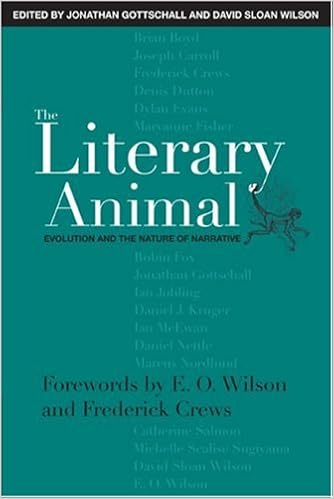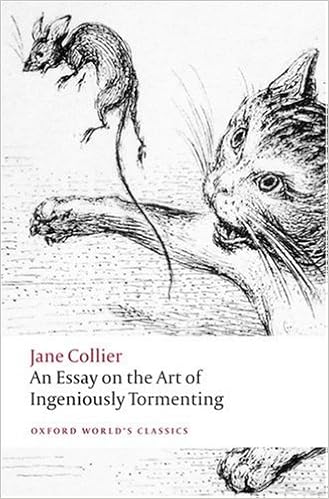
By Jonathan Gottschall, David Sloan Wilson
The target of this publication is to beat a number of the frequent misunderstandings in regards to the which means of a Darwinian method of the human brain more often than not, and literature in particular. the amount brings jointly students from the leading edge of the recent box of evolutionary literary analysis-both literary analysts who've made evolution their explanatory framework and evolutionist scientists who've taken a major curiosity in literature-to exhibit how the human propensity for literature and artwork might be adequately framed as a real evolutionary challenge. Their paintings is a vital step towards the long-prophesied synthesis of the arts and what Steven Pinker calls "the new sciences of human nature."
Read or Download The Literary Animal: Evolution and the Nature of Narrative (Rethinking Theory) PDF
Best Essays Correspondence books
Letters, Fictions, Lives: Henry James and William Dean Howells
During this certain and long-awaited quantity, Michael Anesko records the literary cross-fertilization among Henry James and William Dean Howells, gathering 151 letters, approximately the entire extant correspondence among the 2 males, in addition to the main major severe remark James wrote on Howells and Howells wrote on James.
Byron's Letters and Journals: A New Selection
Along Jane Austen, the Bronte sisters, and Oscar Wilde, Lord Byron possesses a star-quality not like different vintage British authors. . His lifestyles as poet, philanderer, gay, and freedom fighter is famous, and this new choice from his robust letters and journals tells the tale from the interior, in Byron's personal racy and passionate type.
An Essay on the Art of Ingeniously Tormenting (Oxford World's Classics)
Wickedly humorous and bitingly satirical, The paintings is a comedy of manners that offers insights into eighteenth-century habit in addition to the undying artwork of emotional abuse. it's also an suggestion e-book, a guide of anti-etiquette, and a comedy of manners. Collier describes tools for "teasing and mortifying" one's intimates and neighbors in a number of social events.
Letters and Orations (The Other Voice in Early Modern Europe)
Through the top of the 15th century, Cassandra Fedele (1465-1558), a realized middle-class lady of Venice, used to be arguably the main well-known girl author and pupil in Europe. A cultural icon in her personal time, she on a regular basis corresponded with the king of France, lords of Milan and Naples, the Borgia pope Alexander VI, or even maintained a ten-year epistolary trade with Queen Isabella and King Ferdinand of Spain that led to a call for participation for her to affix their courtroom.
Extra info for The Literary Animal: Evolution and the Nature of Narrative (Rethinking Theory)
Characters, authors, and readers) act and imagine as they do, the aptitude benefits for increasing realizing of literary phenomena appeared virtually boundless. real, evolutionary psychology used to be a tender technology in the course of a occasionally ungainly youth, however it had additionally established colossal strength in predicting and explaining features of human habit and psychology, and, including cognitive technology, behavioral genetics, and different fields, it had decisively undermined the scientific respectability of tabula rasa perspectives of human nature. 1 yet tabula rasa theories had no longer misplaced their respectability within the humanities, and whilst I approached my epics professor with a plan for a seminar paper on male conflict in Homer from the point of view of evolutionary conception and examine, he flatly forbade me to jot down it at the grounds of absurdity and irrelevance. as an alternative, he approved me to jot down a paper according to what I have been studying in one other seminar referred to as “Psychoanalytic feedback Applied”; i'll research male conflict in Homer, as I had was hoping, yet i'd do it from the point of view of Freud and Lacan, no longer Darwin. What simply occurred? For my professor, as for nearly the entire different graduate scholars and professors within the English division, psychoanalysis was once thought of first rate (cutting part in relation to Lacan; see Evans, this volume), although psychology and different fields had lengthy in view that rejected it. actually, as in such a lot English departments round the state, Binghamton University’s was once tolerant of a large quantity of other disciplinary, ideological, and theoretical methods. scholars and professors moved fluidly from feminism to Marxism, to queer idea, to psychoanalysis, to continental textual idea, to structuralism, to poststructuralism, and to historicism; they moved throughout the entire warring tribes of philosophy and throughout the entire fighting factions of literary concept and feedback; they drew upon idea and knowledge from sociology, psychology, anthropology, and historical past; they usually drew upon new pondering in chaos concept and quantum physics. after all, there might be excessive war of words and debate over those subject matters, however the principles have been regularly thought of intellectually and politically decent, and folks have been mostly tolerant of the various rules and views represented within the application. xx I NTRODUCTION This tolerance reached its limits, although, while it got here to evolutionary theories of human habit and psychology, towards which scholars and professors evinced not anything yet skepticism, hostility, and, such a lot of all, worry. Older professors, like my epics professor, appeared to see “the bare ape viewpoint” as a churl’s insult to humanity and to nice paintings. the more youthful professors, in addition to my fellow graduate scholars, observed it as whatever some distance worse. I fast realized that after I talked about human habit, psychology, and tradition in evolutionary phrases, their minds churned via an rapid and subconscious technique of translation, and so they heard “Hitler,” “Galton,” “Spencer,” “IQ differences,” “holocaust,” “racial phrenology,” “forced sterilization,” “genetic determinism,” “Darwinian fundamentalism,” and “disciplinary imperialism.



